Analyzing the Impact of Financial Rewards on Organizational Behaviour
VerifiedAdded on 2023/06/10
|8
|2347
|161
Essay
AI Summary
This essay explores the fundamental role of money and financial rewards in the employment relationship and their effectiveness in enhancing employee motivation within an organizational context. It discusses how employee motivation, influenced by both monetary and non-monetary benefits, is crucial for organizational success. The essay analyzes the impact of financial incentives on job satisfaction, employee performance, and overall organizational behavior, highlighting both the advantages, such as increased productivity and psychological benefits, and disadvantages, including potential financial misrepresentation and a failure to address skill gaps. It concludes that while financial rewards are a significant factor in employee motivation and organizational performance, a balanced approach that considers non-monetary incentives and employee development is essential for long-term success. Desklib provides access to this essay and a wealth of other resources to support student learning.
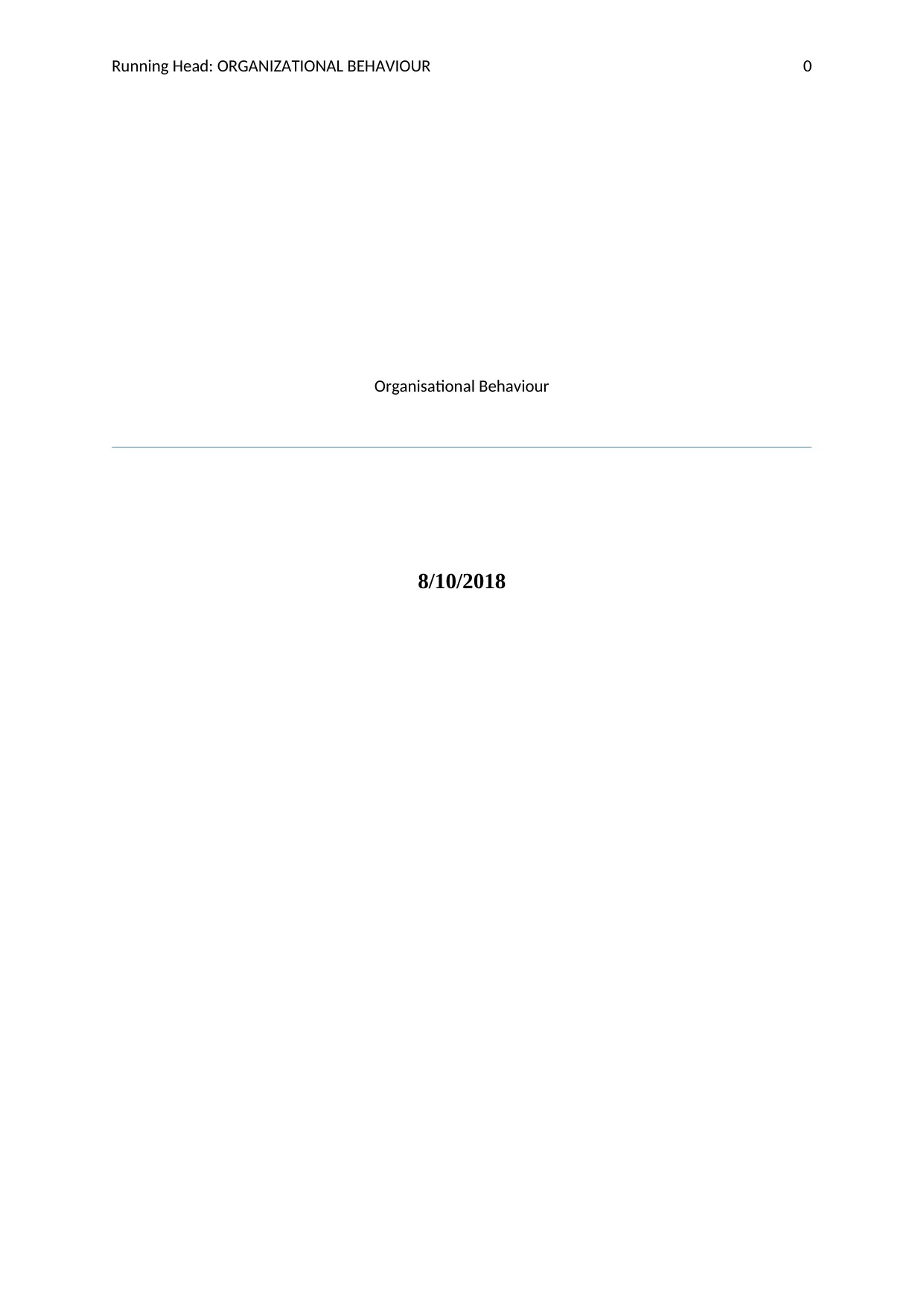
Running Head: ORGANIZATIONAL BEHAVIOUR 0
Organisational Behaviour
8/10/2018
Organisational Behaviour
8/10/2018
Paraphrase This Document
Need a fresh take? Get an instant paraphrase of this document with our AI Paraphraser
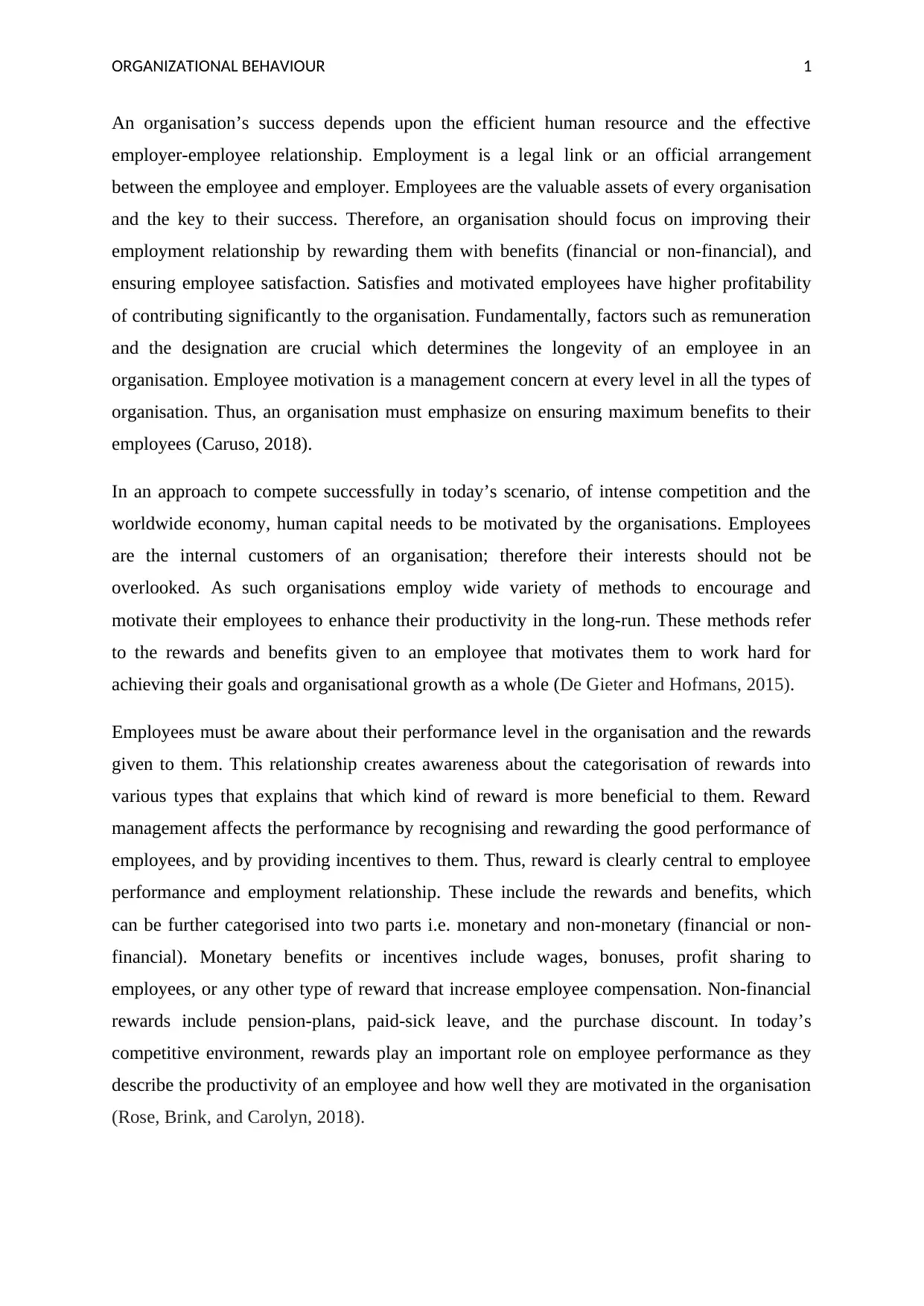
ORGANIZATIONAL BEHAVIOUR 1
An organisation’s success depends upon the efficient human resource and the effective
employer-employee relationship. Employment is a legal link or an official arrangement
between the employee and employer. Employees are the valuable assets of every organisation
and the key to their success. Therefore, an organisation should focus on improving their
employment relationship by rewarding them with benefits (financial or non-financial), and
ensuring employee satisfaction. Satisfies and motivated employees have higher profitability
of contributing significantly to the organisation. Fundamentally, factors such as remuneration
and the designation are crucial which determines the longevity of an employee in an
organisation. Employee motivation is a management concern at every level in all the types of
organisation. Thus, an organisation must emphasize on ensuring maximum benefits to their
employees (Caruso, 2018).
In an approach to compete successfully in today’s scenario, of intense competition and the
worldwide economy, human capital needs to be motivated by the organisations. Employees
are the internal customers of an organisation; therefore their interests should not be
overlooked. As such organisations employ wide variety of methods to encourage and
motivate their employees to enhance their productivity in the long-run. These methods refer
to the rewards and benefits given to an employee that motivates them to work hard for
achieving their goals and organisational growth as a whole (De Gieter and Hofmans, 2015).
Employees must be aware about their performance level in the organisation and the rewards
given to them. This relationship creates awareness about the categorisation of rewards into
various types that explains that which kind of reward is more beneficial to them. Reward
management affects the performance by recognising and rewarding the good performance of
employees, and by providing incentives to them. Thus, reward is clearly central to employee
performance and employment relationship. These include the rewards and benefits, which
can be further categorised into two parts i.e. monetary and non-monetary (financial or non-
financial). Monetary benefits or incentives include wages, bonuses, profit sharing to
employees, or any other type of reward that increase employee compensation. Non-financial
rewards include pension-plans, paid-sick leave, and the purchase discount. In today’s
competitive environment, rewards play an important role on employee performance as they
describe the productivity of an employee and how well they are motivated in the organisation
(Rose, Brink, and Carolyn, 2018).
An organisation’s success depends upon the efficient human resource and the effective
employer-employee relationship. Employment is a legal link or an official arrangement
between the employee and employer. Employees are the valuable assets of every organisation
and the key to their success. Therefore, an organisation should focus on improving their
employment relationship by rewarding them with benefits (financial or non-financial), and
ensuring employee satisfaction. Satisfies and motivated employees have higher profitability
of contributing significantly to the organisation. Fundamentally, factors such as remuneration
and the designation are crucial which determines the longevity of an employee in an
organisation. Employee motivation is a management concern at every level in all the types of
organisation. Thus, an organisation must emphasize on ensuring maximum benefits to their
employees (Caruso, 2018).
In an approach to compete successfully in today’s scenario, of intense competition and the
worldwide economy, human capital needs to be motivated by the organisations. Employees
are the internal customers of an organisation; therefore their interests should not be
overlooked. As such organisations employ wide variety of methods to encourage and
motivate their employees to enhance their productivity in the long-run. These methods refer
to the rewards and benefits given to an employee that motivates them to work hard for
achieving their goals and organisational growth as a whole (De Gieter and Hofmans, 2015).
Employees must be aware about their performance level in the organisation and the rewards
given to them. This relationship creates awareness about the categorisation of rewards into
various types that explains that which kind of reward is more beneficial to them. Reward
management affects the performance by recognising and rewarding the good performance of
employees, and by providing incentives to them. Thus, reward is clearly central to employee
performance and employment relationship. These include the rewards and benefits, which
can be further categorised into two parts i.e. monetary and non-monetary (financial or non-
financial). Monetary benefits or incentives include wages, bonuses, profit sharing to
employees, or any other type of reward that increase employee compensation. Non-financial
rewards include pension-plans, paid-sick leave, and the purchase discount. In today’s
competitive environment, rewards play an important role on employee performance as they
describe the productivity of an employee and how well they are motivated in the organisation
(Rose, Brink, and Carolyn, 2018).
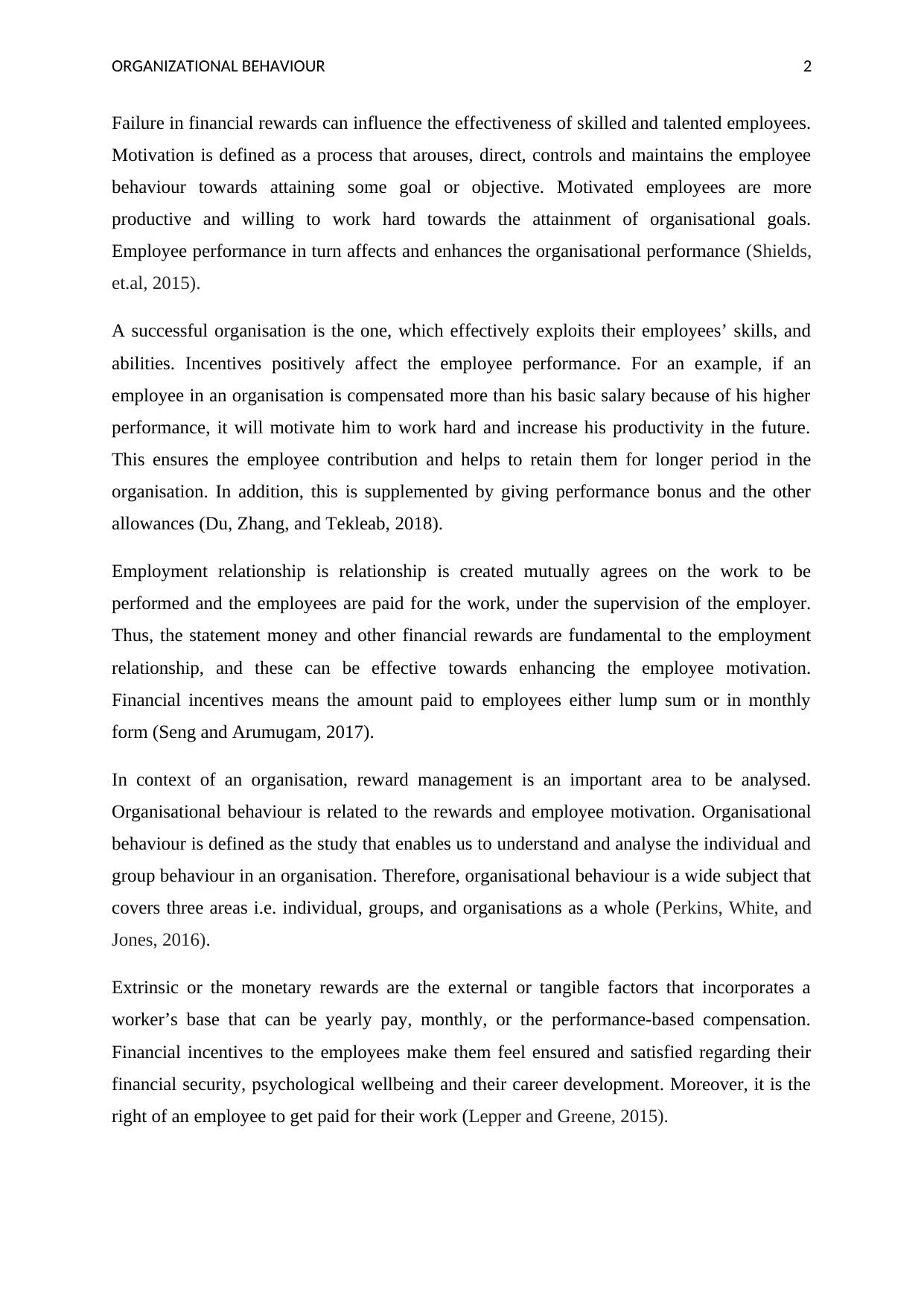
ORGANIZATIONAL BEHAVIOUR 2
Failure in financial rewards can influence the effectiveness of skilled and talented employees.
Motivation is defined as a process that arouses, direct, controls and maintains the employee
behaviour towards attaining some goal or objective. Motivated employees are more
productive and willing to work hard towards the attainment of organisational goals.
Employee performance in turn affects and enhances the organisational performance (Shields,
et.al, 2015).
A successful organisation is the one, which effectively exploits their employees’ skills, and
abilities. Incentives positively affect the employee performance. For an example, if an
employee in an organisation is compensated more than his basic salary because of his higher
performance, it will motivate him to work hard and increase his productivity in the future.
This ensures the employee contribution and helps to retain them for longer period in the
organisation. In addition, this is supplemented by giving performance bonus and the other
allowances (Du, Zhang, and Tekleab, 2018).
Employment relationship is relationship is created mutually agrees on the work to be
performed and the employees are paid for the work, under the supervision of the employer.
Thus, the statement money and other financial rewards are fundamental to the employment
relationship, and these can be effective towards enhancing the employee motivation.
Financial incentives means the amount paid to employees either lump sum or in monthly
form (Seng and Arumugam, 2017).
In context of an organisation, reward management is an important area to be analysed.
Organisational behaviour is related to the rewards and employee motivation. Organisational
behaviour is defined as the study that enables us to understand and analyse the individual and
group behaviour in an organisation. Therefore, organisational behaviour is a wide subject that
covers three areas i.e. individual, groups, and organisations as a whole (Perkins, White, and
Jones, 2016).
Extrinsic or the monetary rewards are the external or tangible factors that incorporates a
worker’s base that can be yearly pay, monthly, or the performance-based compensation.
Financial incentives to the employees make them feel ensured and satisfied regarding their
financial security, psychological wellbeing and their career development. Moreover, it is the
right of an employee to get paid for their work (Lepper and Greene, 2015).
Failure in financial rewards can influence the effectiveness of skilled and talented employees.
Motivation is defined as a process that arouses, direct, controls and maintains the employee
behaviour towards attaining some goal or objective. Motivated employees are more
productive and willing to work hard towards the attainment of organisational goals.
Employee performance in turn affects and enhances the organisational performance (Shields,
et.al, 2015).
A successful organisation is the one, which effectively exploits their employees’ skills, and
abilities. Incentives positively affect the employee performance. For an example, if an
employee in an organisation is compensated more than his basic salary because of his higher
performance, it will motivate him to work hard and increase his productivity in the future.
This ensures the employee contribution and helps to retain them for longer period in the
organisation. In addition, this is supplemented by giving performance bonus and the other
allowances (Du, Zhang, and Tekleab, 2018).
Employment relationship is relationship is created mutually agrees on the work to be
performed and the employees are paid for the work, under the supervision of the employer.
Thus, the statement money and other financial rewards are fundamental to the employment
relationship, and these can be effective towards enhancing the employee motivation.
Financial incentives means the amount paid to employees either lump sum or in monthly
form (Seng and Arumugam, 2017).
In context of an organisation, reward management is an important area to be analysed.
Organisational behaviour is related to the rewards and employee motivation. Organisational
behaviour is defined as the study that enables us to understand and analyse the individual and
group behaviour in an organisation. Therefore, organisational behaviour is a wide subject that
covers three areas i.e. individual, groups, and organisations as a whole (Perkins, White, and
Jones, 2016).
Extrinsic or the monetary rewards are the external or tangible factors that incorporates a
worker’s base that can be yearly pay, monthly, or the performance-based compensation.
Financial incentives to the employees make them feel ensured and satisfied regarding their
financial security, psychological wellbeing and their career development. Moreover, it is the
right of an employee to get paid for their work (Lepper and Greene, 2015).
⊘ This is a preview!⊘
Do you want full access?
Subscribe today to unlock all pages.

Trusted by 1+ million students worldwide
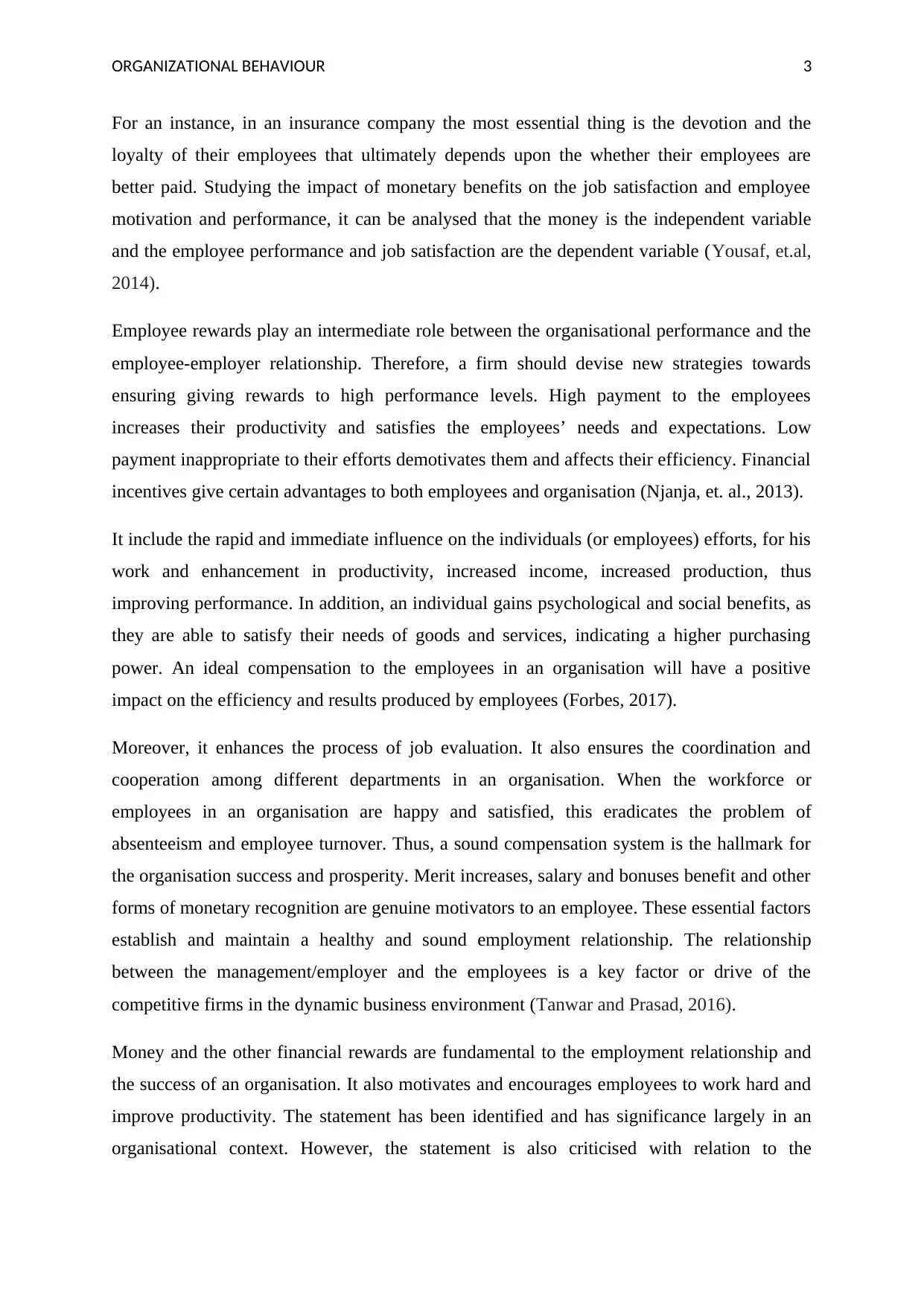
ORGANIZATIONAL BEHAVIOUR 3
For an instance, in an insurance company the most essential thing is the devotion and the
loyalty of their employees that ultimately depends upon the whether their employees are
better paid. Studying the impact of monetary benefits on the job satisfaction and employee
motivation and performance, it can be analysed that the money is the independent variable
and the employee performance and job satisfaction are the dependent variable (Yousaf, et.al,
2014).
Employee rewards play an intermediate role between the organisational performance and the
employee-employer relationship. Therefore, a firm should devise new strategies towards
ensuring giving rewards to high performance levels. High payment to the employees
increases their productivity and satisfies the employees’ needs and expectations. Low
payment inappropriate to their efforts demotivates them and affects their efficiency. Financial
incentives give certain advantages to both employees and organisation (Njanja, et. al., 2013).
It include the rapid and immediate influence on the individuals (or employees) efforts, for his
work and enhancement in productivity, increased income, increased production, thus
improving performance. In addition, an individual gains psychological and social benefits, as
they are able to satisfy their needs of goods and services, indicating a higher purchasing
power. An ideal compensation to the employees in an organisation will have a positive
impact on the efficiency and results produced by employees (Forbes, 2017).
Moreover, it enhances the process of job evaluation. It also ensures the coordination and
cooperation among different departments in an organisation. When the workforce or
employees in an organisation are happy and satisfied, this eradicates the problem of
absenteeism and employee turnover. Thus, a sound compensation system is the hallmark for
the organisation success and prosperity. Merit increases, salary and bonuses benefit and other
forms of monetary recognition are genuine motivators to an employee. These essential factors
establish and maintain a healthy and sound employment relationship. The relationship
between the management/employer and the employees is a key factor or drive of the
competitive firms in the dynamic business environment (Tanwar and Prasad, 2016).
Money and the other financial rewards are fundamental to the employment relationship and
the success of an organisation. It also motivates and encourages employees to work hard and
improve productivity. The statement has been identified and has significance largely in an
organisational context. However, the statement is also criticised with relation to the
For an instance, in an insurance company the most essential thing is the devotion and the
loyalty of their employees that ultimately depends upon the whether their employees are
better paid. Studying the impact of monetary benefits on the job satisfaction and employee
motivation and performance, it can be analysed that the money is the independent variable
and the employee performance and job satisfaction are the dependent variable (Yousaf, et.al,
2014).
Employee rewards play an intermediate role between the organisational performance and the
employee-employer relationship. Therefore, a firm should devise new strategies towards
ensuring giving rewards to high performance levels. High payment to the employees
increases their productivity and satisfies the employees’ needs and expectations. Low
payment inappropriate to their efforts demotivates them and affects their efficiency. Financial
incentives give certain advantages to both employees and organisation (Njanja, et. al., 2013).
It include the rapid and immediate influence on the individuals (or employees) efforts, for his
work and enhancement in productivity, increased income, increased production, thus
improving performance. In addition, an individual gains psychological and social benefits, as
they are able to satisfy their needs of goods and services, indicating a higher purchasing
power. An ideal compensation to the employees in an organisation will have a positive
impact on the efficiency and results produced by employees (Forbes, 2017).
Moreover, it enhances the process of job evaluation. It also ensures the coordination and
cooperation among different departments in an organisation. When the workforce or
employees in an organisation are happy and satisfied, this eradicates the problem of
absenteeism and employee turnover. Thus, a sound compensation system is the hallmark for
the organisation success and prosperity. Merit increases, salary and bonuses benefit and other
forms of monetary recognition are genuine motivators to an employee. These essential factors
establish and maintain a healthy and sound employment relationship. The relationship
between the management/employer and the employees is a key factor or drive of the
competitive firms in the dynamic business environment (Tanwar and Prasad, 2016).
Money and the other financial rewards are fundamental to the employment relationship and
the success of an organisation. It also motivates and encourages employees to work hard and
improve productivity. The statement has been identified and has significance largely in an
organisational context. However, the statement is also criticised with relation to the
Paraphrase This Document
Need a fresh take? Get an instant paraphrase of this document with our AI Paraphraser
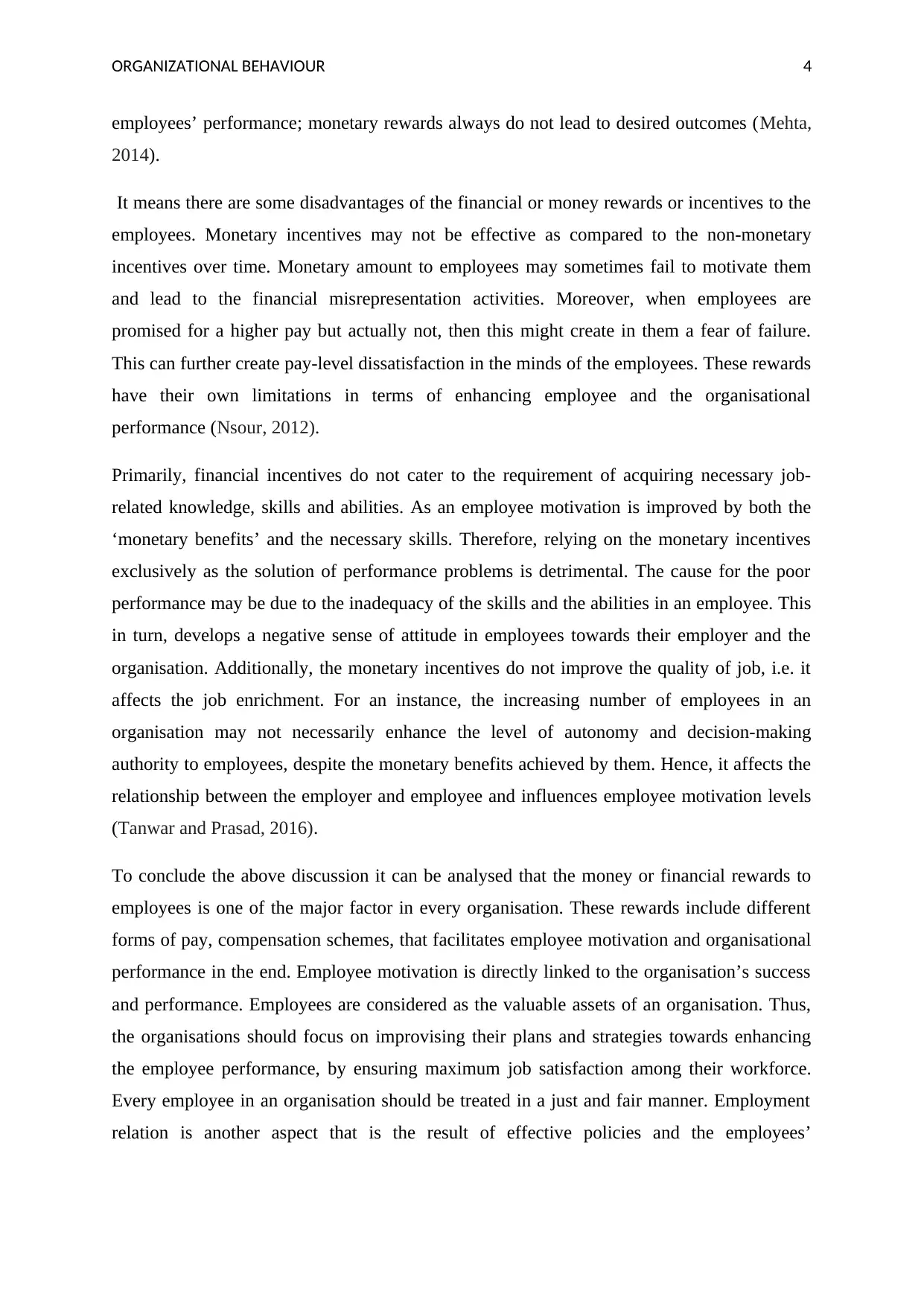
ORGANIZATIONAL BEHAVIOUR 4
employees’ performance; monetary rewards always do not lead to desired outcomes (Mehta,
2014).
It means there are some disadvantages of the financial or money rewards or incentives to the
employees. Monetary incentives may not be effective as compared to the non-monetary
incentives over time. Monetary amount to employees may sometimes fail to motivate them
and lead to the financial misrepresentation activities. Moreover, when employees are
promised for a higher pay but actually not, then this might create in them a fear of failure.
This can further create pay-level dissatisfaction in the minds of the employees. These rewards
have their own limitations in terms of enhancing employee and the organisational
performance (Nsour, 2012).
Primarily, financial incentives do not cater to the requirement of acquiring necessary job-
related knowledge, skills and abilities. As an employee motivation is improved by both the
‘monetary benefits’ and the necessary skills. Therefore, relying on the monetary incentives
exclusively as the solution of performance problems is detrimental. The cause for the poor
performance may be due to the inadequacy of the skills and the abilities in an employee. This
in turn, develops a negative sense of attitude in employees towards their employer and the
organisation. Additionally, the monetary incentives do not improve the quality of job, i.e. it
affects the job enrichment. For an instance, the increasing number of employees in an
organisation may not necessarily enhance the level of autonomy and decision-making
authority to employees, despite the monetary benefits achieved by them. Hence, it affects the
relationship between the employer and employee and influences employee motivation levels
(Tanwar and Prasad, 2016).
To conclude the above discussion it can be analysed that the money or financial rewards to
employees is one of the major factor in every organisation. These rewards include different
forms of pay, compensation schemes, that facilitates employee motivation and organisational
performance in the end. Employee motivation is directly linked to the organisation’s success
and performance. Employees are considered as the valuable assets of an organisation. Thus,
the organisations should focus on improvising their plans and strategies towards enhancing
the employee performance, by ensuring maximum job satisfaction among their workforce.
Every employee in an organisation should be treated in a just and fair manner. Employment
relation is another aspect that is the result of effective policies and the employees’
employees’ performance; monetary rewards always do not lead to desired outcomes (Mehta,
2014).
It means there are some disadvantages of the financial or money rewards or incentives to the
employees. Monetary incentives may not be effective as compared to the non-monetary
incentives over time. Monetary amount to employees may sometimes fail to motivate them
and lead to the financial misrepresentation activities. Moreover, when employees are
promised for a higher pay but actually not, then this might create in them a fear of failure.
This can further create pay-level dissatisfaction in the minds of the employees. These rewards
have their own limitations in terms of enhancing employee and the organisational
performance (Nsour, 2012).
Primarily, financial incentives do not cater to the requirement of acquiring necessary job-
related knowledge, skills and abilities. As an employee motivation is improved by both the
‘monetary benefits’ and the necessary skills. Therefore, relying on the monetary incentives
exclusively as the solution of performance problems is detrimental. The cause for the poor
performance may be due to the inadequacy of the skills and the abilities in an employee. This
in turn, develops a negative sense of attitude in employees towards their employer and the
organisation. Additionally, the monetary incentives do not improve the quality of job, i.e. it
affects the job enrichment. For an instance, the increasing number of employees in an
organisation may not necessarily enhance the level of autonomy and decision-making
authority to employees, despite the monetary benefits achieved by them. Hence, it affects the
relationship between the employer and employee and influences employee motivation levels
(Tanwar and Prasad, 2016).
To conclude the above discussion it can be analysed that the money or financial rewards to
employees is one of the major factor in every organisation. These rewards include different
forms of pay, compensation schemes, that facilitates employee motivation and organisational
performance in the end. Employee motivation is directly linked to the organisation’s success
and performance. Employees are considered as the valuable assets of an organisation. Thus,
the organisations should focus on improvising their plans and strategies towards enhancing
the employee performance, by ensuring maximum job satisfaction among their workforce.
Every employee in an organisation should be treated in a just and fair manner. Employment
relation is another aspect that is the result of effective policies and the employees’
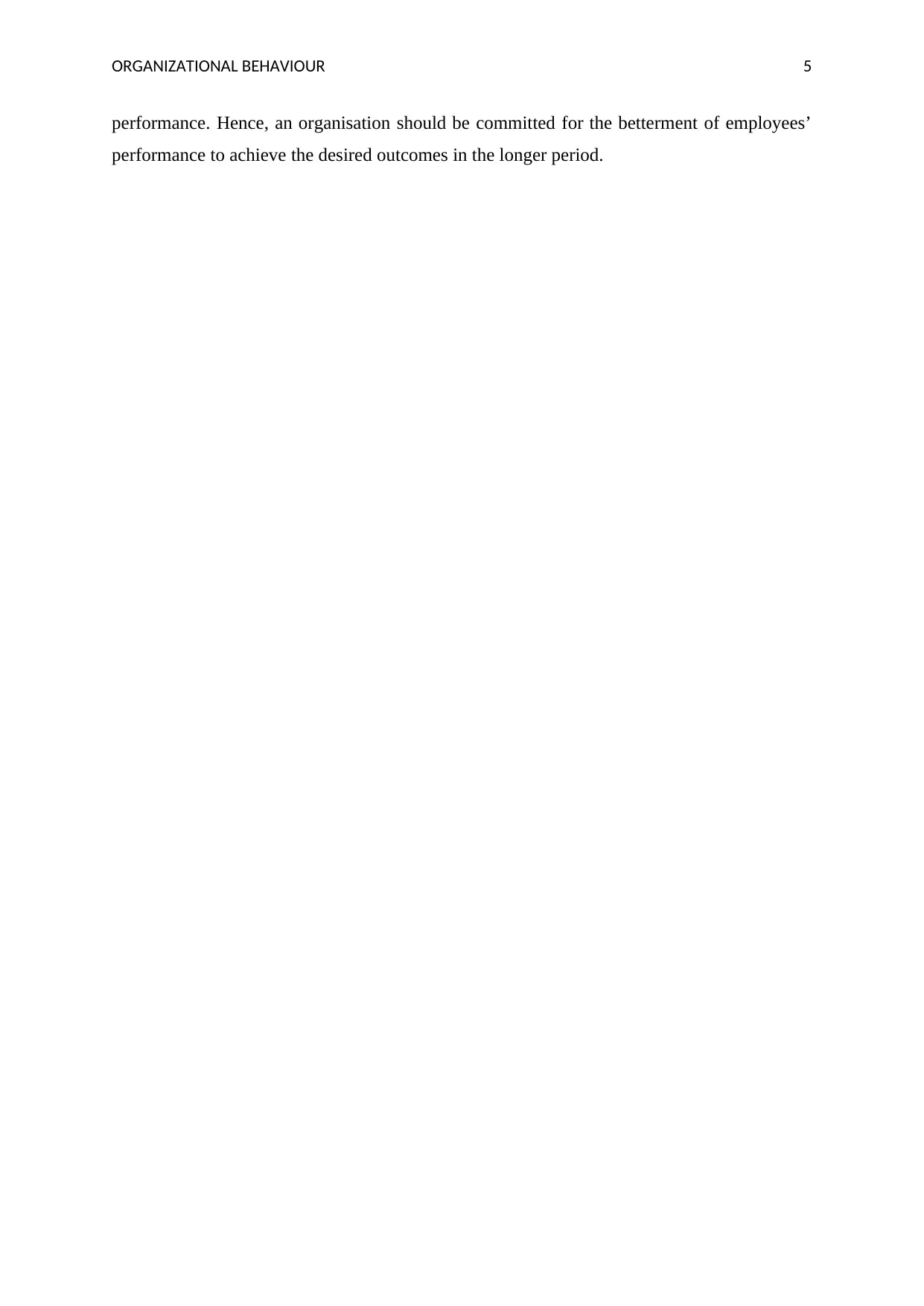
ORGANIZATIONAL BEHAVIOUR 5
performance. Hence, an organisation should be committed for the betterment of employees’
performance to achieve the desired outcomes in the longer period.
performance. Hence, an organisation should be committed for the betterment of employees’
performance to achieve the desired outcomes in the longer period.
⊘ This is a preview!⊘
Do you want full access?
Subscribe today to unlock all pages.

Trusted by 1+ million students worldwide
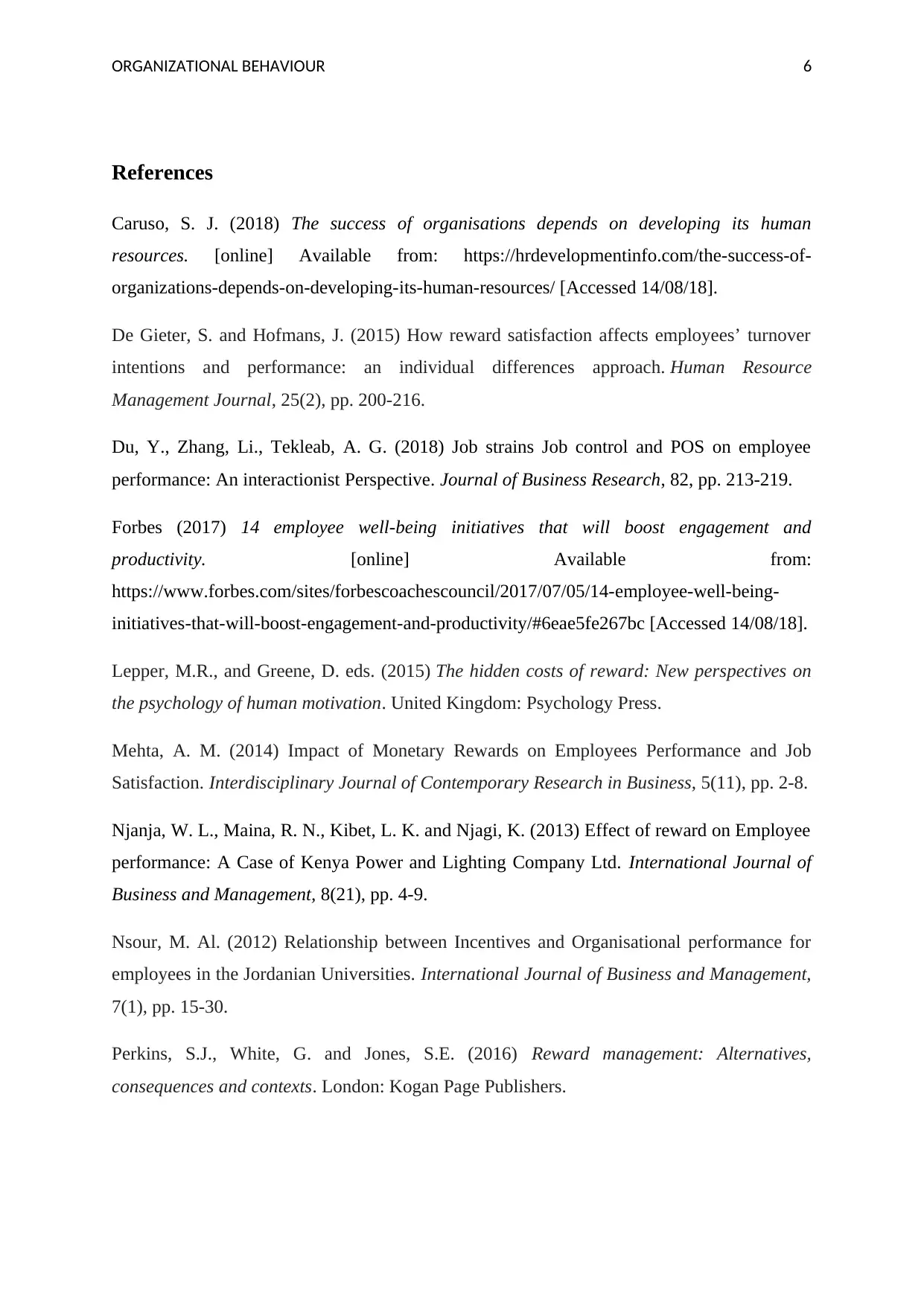
ORGANIZATIONAL BEHAVIOUR 6
References
Caruso, S. J. (2018) The success of organisations depends on developing its human
resources. [online] Available from: https://hrdevelopmentinfo.com/the-success-of-
organizations-depends-on-developing-its-human-resources/ [Accessed 14/08/18].
De Gieter, S. and Hofmans, J. (2015) How reward satisfaction affects employees’ turnover
intentions and performance: an individual differences approach. Human Resource
Management Journal, 25(2), pp. 200-216.
Du, Y., Zhang, Li., Tekleab, A. G. (2018) Job strains Job control and POS on employee
performance: An interactionist Perspective. Journal of Business Research, 82, pp. 213-219.
Forbes (2017) 14 employee well-being initiatives that will boost engagement and
productivity. [online] Available from:
https://www.forbes.com/sites/forbescoachescouncil/2017/07/05/14-employee-well-being-
initiatives-that-will-boost-engagement-and-productivity/#6eae5fe267bc [Accessed 14/08/18].
Lepper, M.R., and Greene, D. eds. (2015) The hidden costs of reward: New perspectives on
the psychology of human motivation. United Kingdom: Psychology Press.
Mehta, A. M. (2014) Impact of Monetary Rewards on Employees Performance and Job
Satisfaction. Interdisciplinary Journal of Contemporary Research in Business, 5(11), pp. 2-8.
Njanja, W. L., Maina, R. N., Kibet, L. K. and Njagi, K. (2013) Effect of reward on Employee
performance: A Case of Kenya Power and Lighting Company Ltd. International Journal of
Business and Management, 8(21), pp. 4-9.
Nsour, M. Al. (2012) Relationship between Incentives and Organisational performance for
employees in the Jordanian Universities. International Journal of Business and Management,
7(1), pp. 15-30.
Perkins, S.J., White, G. and Jones, S.E. (2016) Reward management: Alternatives,
consequences and contexts. London: Kogan Page Publishers.
References
Caruso, S. J. (2018) The success of organisations depends on developing its human
resources. [online] Available from: https://hrdevelopmentinfo.com/the-success-of-
organizations-depends-on-developing-its-human-resources/ [Accessed 14/08/18].
De Gieter, S. and Hofmans, J. (2015) How reward satisfaction affects employees’ turnover
intentions and performance: an individual differences approach. Human Resource
Management Journal, 25(2), pp. 200-216.
Du, Y., Zhang, Li., Tekleab, A. G. (2018) Job strains Job control and POS on employee
performance: An interactionist Perspective. Journal of Business Research, 82, pp. 213-219.
Forbes (2017) 14 employee well-being initiatives that will boost engagement and
productivity. [online] Available from:
https://www.forbes.com/sites/forbescoachescouncil/2017/07/05/14-employee-well-being-
initiatives-that-will-boost-engagement-and-productivity/#6eae5fe267bc [Accessed 14/08/18].
Lepper, M.R., and Greene, D. eds. (2015) The hidden costs of reward: New perspectives on
the psychology of human motivation. United Kingdom: Psychology Press.
Mehta, A. M. (2014) Impact of Monetary Rewards on Employees Performance and Job
Satisfaction. Interdisciplinary Journal of Contemporary Research in Business, 5(11), pp. 2-8.
Njanja, W. L., Maina, R. N., Kibet, L. K. and Njagi, K. (2013) Effect of reward on Employee
performance: A Case of Kenya Power and Lighting Company Ltd. International Journal of
Business and Management, 8(21), pp. 4-9.
Nsour, M. Al. (2012) Relationship between Incentives and Organisational performance for
employees in the Jordanian Universities. International Journal of Business and Management,
7(1), pp. 15-30.
Perkins, S.J., White, G. and Jones, S.E. (2016) Reward management: Alternatives,
consequences and contexts. London: Kogan Page Publishers.
Paraphrase This Document
Need a fresh take? Get an instant paraphrase of this document with our AI Paraphraser
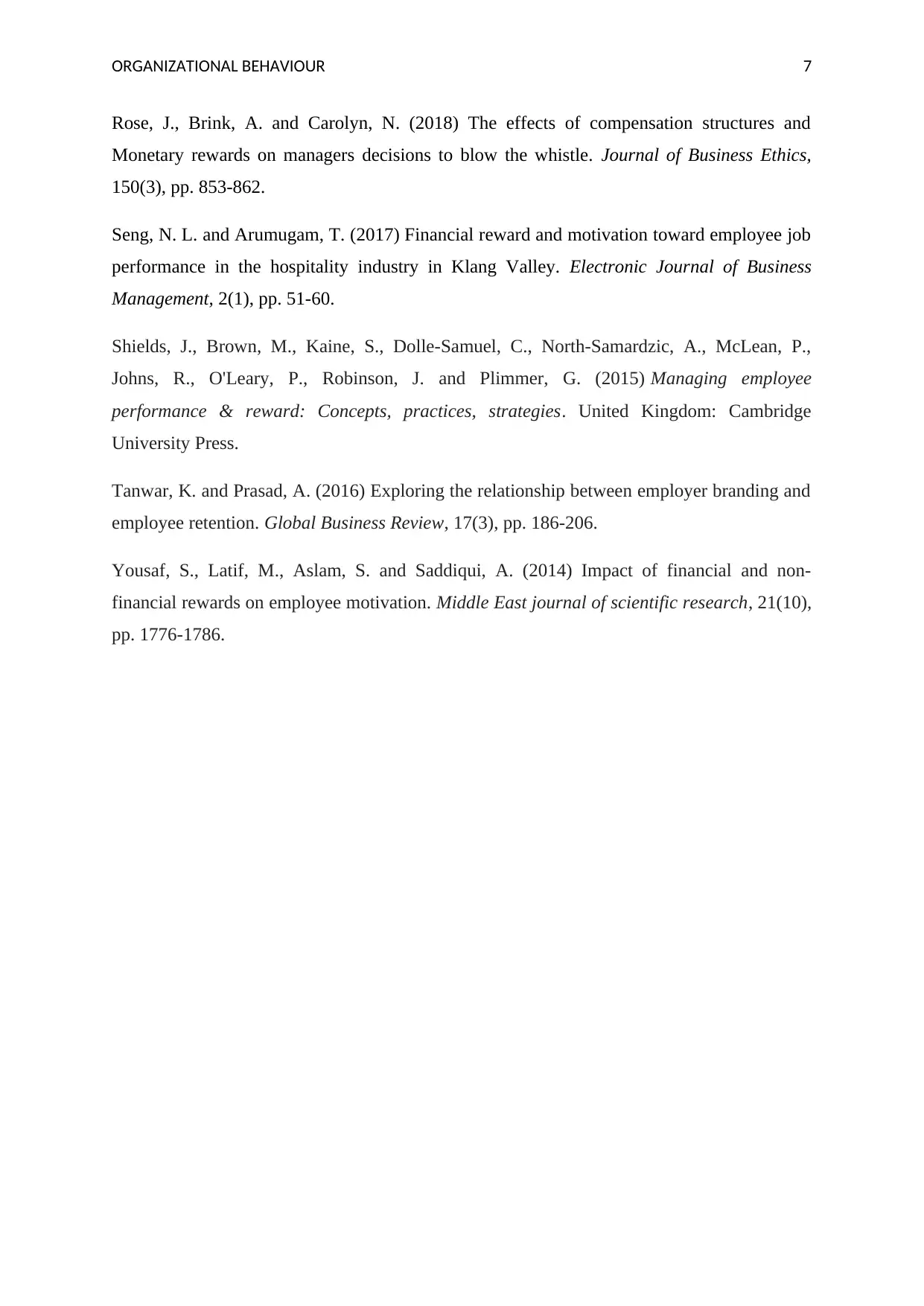
ORGANIZATIONAL BEHAVIOUR 7
Rose, J., Brink, A. and Carolyn, N. (2018) The effects of compensation structures and
Monetary rewards on managers decisions to blow the whistle. Journal of Business Ethics,
150(3), pp. 853-862.
Seng, N. L. and Arumugam, T. (2017) Financial reward and motivation toward employee job
performance in the hospitality industry in Klang Valley. Electronic Journal of Business
Management, 2(1), pp. 51-60.
Shields, J., Brown, M., Kaine, S., Dolle-Samuel, C., North-Samardzic, A., McLean, P.,
Johns, R., O'Leary, P., Robinson, J. and Plimmer, G. (2015) Managing employee
performance & reward: Concepts, practices, strategies. United Kingdom: Cambridge
University Press.
Tanwar, K. and Prasad, A. (2016) Exploring the relationship between employer branding and
employee retention. Global Business Review, 17(3), pp. 186-206.
Yousaf, S., Latif, M., Aslam, S. and Saddiqui, A. (2014) Impact of financial and non-
financial rewards on employee motivation. Middle East journal of scientific research, 21(10),
pp. 1776-1786.
Rose, J., Brink, A. and Carolyn, N. (2018) The effects of compensation structures and
Monetary rewards on managers decisions to blow the whistle. Journal of Business Ethics,
150(3), pp. 853-862.
Seng, N. L. and Arumugam, T. (2017) Financial reward and motivation toward employee job
performance in the hospitality industry in Klang Valley. Electronic Journal of Business
Management, 2(1), pp. 51-60.
Shields, J., Brown, M., Kaine, S., Dolle-Samuel, C., North-Samardzic, A., McLean, P.,
Johns, R., O'Leary, P., Robinson, J. and Plimmer, G. (2015) Managing employee
performance & reward: Concepts, practices, strategies. United Kingdom: Cambridge
University Press.
Tanwar, K. and Prasad, A. (2016) Exploring the relationship between employer branding and
employee retention. Global Business Review, 17(3), pp. 186-206.
Yousaf, S., Latif, M., Aslam, S. and Saddiqui, A. (2014) Impact of financial and non-
financial rewards on employee motivation. Middle East journal of scientific research, 21(10),
pp. 1776-1786.
1 out of 8
Related Documents
Your All-in-One AI-Powered Toolkit for Academic Success.
+13062052269
info@desklib.com
Available 24*7 on WhatsApp / Email
![[object Object]](/_next/static/media/star-bottom.7253800d.svg)
Unlock your academic potential
Copyright © 2020–2026 A2Z Services. All Rights Reserved. Developed and managed by ZUCOL.




